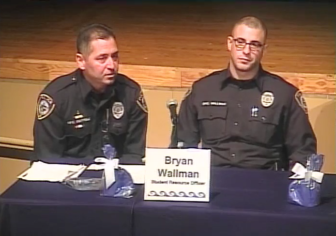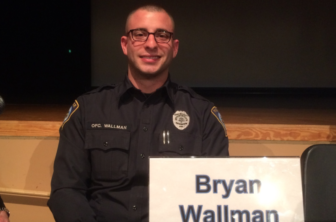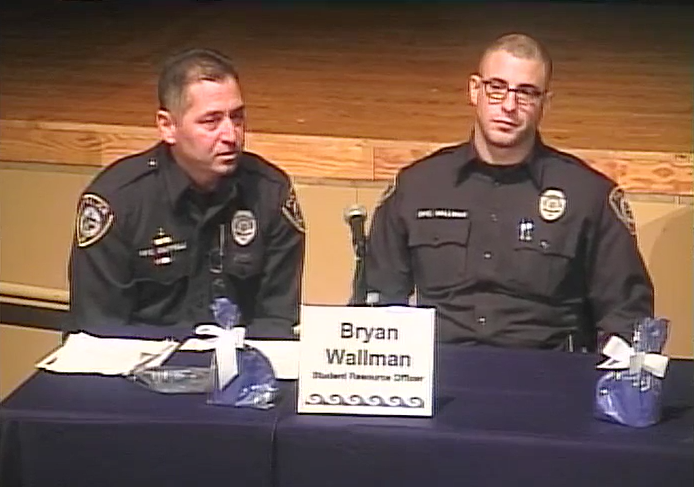When police are alerted to a teenage drinking party in Darien, most of what they do revolves around the safety of the under-age drinkers there and the safety of other people who might be on the road when intoxicated drivers from the party go home.
That was one of the themes brought up by two Darien police officers involved with youths in town when the officers spoke recently at a meeting for parents at Darien High School.
Detective Mark Cappelli, who works on cases involving youths in town, and Officer Bryan Wallman, who had just been named (two days before the meeting) as school resource officer for Darien High School, replacing James Palmieri, who had just been named a detective.

From left: Detective Mark Cappelli, Police Officer Bryan Wallman, the Darien High School resource officer, at the \”Truth and Consequences\” panel discussion
Cappelli, who grew up in town and lives here with his wife and daughter, has been on the Darien police force for 21 years, and on the Youth Bureau for the past nine years.
Wallman has been a police officer in town for the past decade and previously was school resource officer at Hindley School. Wallman has also worked with the Cops & Kids program and has worked with students on the Darien High School wrestling team.
The two officers spoke at the “Truth and Consequences” panel discussion held at Darien High School Auditorium on Feb. 7. It was sponsored by the Darien High School Parents Association, the Middlesex Middle School Parents Association and the Community Fund of Darien, as part of its Thriving Youth Initiative.
Cappelli and Wallman spent most of their time talking about police officers and teenage drinking parties, but what they had to say stretched beyond that, and most of what they said is in this article. (A bit more of what they said will be in a future article, together with comments from others on the panel.) You can see and hear them speaking in a video of the event now on the Darien TV79 Vimeo Web page (and at the bottom of this article). Even if you watch the entire video, we think these transcripts of comments are a great way to review and consider what you’ve heard.
Here’s a slightly edited transcript of what was said. Words or passages that have been left out are marked by ellipses (“[…]”). Passages have been omitted when they were tangential to the main points or where the wording might have been distracting. For more information on how we edited these statements, see the editor’s note at bottom of this article.
Waldman

Darien Police Officer Bryan Wallman, a 10-year veteran of the force, is the new school resource officer at Darien High School.
It’s not necessarily a problem unique to Darien that teenagers are drinking […] I think the problem unique to Darien is the amount of alcohol that’s being consumed at these parties. I can tell you, just from patrol experience [of] going to these parties after everyone runs to the back door of the house, the amount of alcohol that’s left behind is startling, to be honest with you. It’s shocking.
And it isn’t necessarily what’s still left behind — it’s what’s been drunk. There’s empty beer cans there — hundreds and hundreds of beer cans, and the amount of kids that are actually at the party — the ratio [of kids to beer] is insane, when you think about it.
And the […] [number] of times that we’ve had to call Post 53 to come and scoop up an underage drinker and bring them to the hospital to have their stomach pumped — it’s becoming more and more the norm instead of just finding an empty house with no one in it. We’re finding, unfortunately, kids left behind in the basement that are in need of serious medical attention.
So that’s a lot of what we’ve been seeing.
From a Community Fund of Darien announcement on the “Truth and Consequences” panel discussion:
Darien excels in many areas, including underage drinking rates. With the best SAT scores in Connecticut, over 740 AP exams completed last year and the most state championships of any town in Connecticut, Darien is well known for its excellence in academic and athletic achievement. Unfortunately, a far more troubling statistic also distinguishes our town. When compared to Fairfield County peer towns, Darien has the highest reported rate of alcohol abuse among teenagers. As parents and as a community, we need to do something about this troubling and dangerous situation. To learn more about this issue and what we’re doing about it, visit www.OurDarien.com.
Also, some changes in the law we’ve had to enforce — especially the new social host law. Essentially, if you are permitting anyone under the age of 21 to illegally possess alcohol, it’s an infraction for the first time, which will turn into a misdemeanor for your second time. So that’s essentially if you’re allowing it to happen inside of your home […]
The law is very vague. The law says that if you are allowing it to happen inside of your home and you should know that it’s happening, you can be charged with this. It gives a lot of leeway to the police officers, so we sometimes shy away from that and instead give the infraction.
Cappelli
[Cappelli said he’d been asked by the organizers to talk about what the police response is to a report of an underage drinking party and how police find out about them.]
One of our newest tools […] is an Internet-based tip line in which you can tip information in from your phone, from a computer, or you can dial it in, and it’s totally anonymous. There’s no way for us to track where that call came from, but we can open a dialogue with that person [the tipster] if further investigation needs to come from it.
For an under-age party, we probably don’t need to open up further dialogue, but for an ongoing narcotics investigation we may want to — and it’s just an anonymous back and forth.
__________________
See also:
- DHS Principal Ellen Dunn on Drugs, Drinking, Disciplining Students and What Parents Can Do (Feb. 12; article from the same “Truth and Consequences” meeting)
- Panelists: High Rate of Teen Drinking in Darien Comes with High Stress, Lax Attitudes (Feb. 8; article from the same “Truth and Consequences” meeting)
- Experts Offer Parents Tips on Building Resiliency, Respecting Kids While Holding Them to Standards (Feb. 19)
- Darien Health Dept: How Many of These Risks from Under-Age Drinking Do You Know? (Feb. 19)
- Commentary: Parents Need to Make Clear to Teens That Drinking Is Unacceptable (Feb. 7)
- ‘Truth & Consequences’ Panel Discussion on Teen Drinking at DHS Auditorium (Feb. 7)
- VIDEO: Stories from Connecticut, Struggles with the Opioid Epidemic (Feb. 4)
- Group Launches Campaign to Counter Darien’s ‘Troubling Rate of Teenage Binge Drinking’ (Feb. 2)
- DRINKING IN DARIEN: Worse than Elsewhere for Both Teens and Adults — and the Problem is Growing (Jan. 30)
- Police Detective: We Can’t Arrest Our Way Out of Drug Addiction in Darien (Feb. 7)
_____________
So the incidents come in via the tip line — sometimes from a student that maybe wasn’t invited to a party or who was asked to leave, or from the neighbors because there are kids being loud in the back yard or cars parked up and down the road or driving recklessly.
So when I give this presentation to the kids, they think we’re rappelling out of trees to get to your front lawn and digging tunnels up to the front door. That’s not how it happens — we merely park the car and walk up.
And the evidence is displayed in front of us — you don’t have to be a detective to find it. There’s the red Solo cups. There’s the beer cans. There’s loud music. There’s usually someone who yells “Oh—” you-know-what “The cops!” and out the back door they go.
We’ also tell these kids that we have a job to do and this isn’t one of the more fun tasks that we’re asked to do, for a host of reasons:
- A lot of times they [reports of parties] come in late at night. That officer’s about to go home, and now he’s there till 2 or 3 in the morning, contacting parents […] to come and collect the kids. […]
- You’re running kids down in the woods, if you’re still fit to do so.
- And unfortunately there’s a little bit of attitude that comes with the kids when we have to go to a house (I, fortunately, haven’t had to go to a house for a long time; I’m stuck inside, now; I do the follow-up) — the feeling that the police officer shouldn’t be on the property, [that] they’re not allowed into the house without a warrant. You’ve heard all the excuses.
We have certain circumstances that allow us to go into the house. One is to look for incapacitated children. They hide in the closet, and they’ve been drinking, they fall asleep and pass out, and they vomit and aspirate on [choke on] the vomit.
You know, we’re held responsible for not finding them in the attic or the closet — wherever they’ve hid. So that’s part of what we have to do.
We don’t necessarily have to issue an infraction or take any kind of legal action. That’s dependent on the circumstances we find when we get there — the attitude of all people involved.
Have we been here before? Has this child been on the “radar” before and been spoken to before?
But [for] every kid […] that is there, it’s our policy that that kid’s name goes into a police report, and that [kid’s] parent is notified, and the parent is requested to come get the child at the scene. So that’s going to happen.
That parlays into the school finding out about it, and if they [the students] are on commitment for one reason or another, it goes down to — well, he was there, but he wasn’t drinking, or she was there, but she was only picking up a friend. And that’s kind of a gray area for us and the Board of Ed, but that’s what our response to these parties typically involves.
I’ll just touch on one other thing, and that’s what are the rules for reporting your [child’s] identity to the press. If you’re under 18, you’re a juvenile, and your name doesn’t go in the paper. The incident itself will make it into the paper.
Each media outlet has their own parameters that they report. Some will say “a home on Hollow Tree Ridge Road.” Some will say [a specific house number on] Hollow Tree Ridge Road.
[…]
If you are arrested, that violation will go away in a certain amount of months […] If you don’t get in trouble in a certain time frame, it’s as if it never happened.
Wallman
What do we wish parents and teens knew about our role in under-age drinking violations? It’s not, as Mark [Cappelli] said, it’s not fun. I think it’s an old stereotype that Darien police officers are hunting down parties. That’s certainly not our goal, but I wish some of these kids, when we showed up at some of these parties, understood how important it is.
We’re the caretaker for that short amount of time that we’re there, so any punishments that we’re handing out — or you guys [parents], when we’re calling up parents and there are punishments that you are handing out — that’s all because we genuinely care, and we want to keep everybody safe.
I think that too often it gets mixed up that we’re there just to get people in trouble. We’re not. We’re there to keep people safe, and that’s why these laws are getting stricter. […]
Cappelli: ‘It Turns Into Sexual Assault Sometimes’
One other quick thing — alcohol is one thing, and alcohol poisoning and what it may lead to. The other thing you have to consider when you have these parties at your house or you allow them to drink at your house or whatever is, you know, sometimes where it leads.
It’s not always just the alcohol, […] it turns into sexual assault sometimes.
_____________
Like this article? …
- Sign up for the Darienite.com weekday newsletter.
- Like Darienite.com on Facebook.
- Follow Darienite.com on Twitter.
_____________
I know last year I had to investigate two of them [sexual assault allegations]. They were both college kids, but they both involved alcohol, and at the time, I guess, everything seemed OK. The next day, they talked to people — it wasn’t so OK.
They go through the rape kits, the investigation and all that kind of stuff, and only to find out that they just want to walk away from it, because they’re feeling is that, well, this isn’t going to go anywhere, anyhow, and once they find out I’ve been drinking, it’s done — which is unfortunate, because that’s not our [police investigators’] take on it. We’ll pursue it as much as we can.
[So] there are other “sidebar” effects of the alcohol — the sexual assaults, the fights, the DWIs, motor vehicle accidents. There was a couple of horrific ones this [past] year. I’m sure you all read about them in the paper, where kids almost died. We haven’t had a fatality, thankfully [knocks on wood] and we’re hoping.
That’s one of the worst calls to make on a parent: Showing up to their doorstep and have to inform them of something like that. […]
Wallman: ‘Takes the Edge off a Really Hard School Week’
I’m really amazed by the competitiveness in the student body. It’s not necessarily something they talk about. They’re not, you know [saying], “I’ve got better grades than you,” but everyone is striving for college, everyone is working extremely hard. I haven’t met one kid that’s totally said “Nah, college — whatever — I’m not worried about it. It’s not something I’m interested in.”
Everyone’s pushing really hard. Everyone wants these good grades. I think some of the stressors that we’ve all talked about on the panel are definitely contributing [in] this type of town where if you see another kid who’s pushing really hard for college, it kind of resonates within the community, and kids get competitive in that sense, where they all want to go to a good college. […]
I think it’s unique to this type of more affluent communities where the kids are pushing each other fairly hard, and, you know, having some beers on the weekend or smoking some weed kind of takes the edge off of a really hard school week. So that’s something to think about.
Video of the Entire Meeting
A video recording of the 94-minute meeting was published first on the Darien Public Schools video Web page and more recently on Darien TV79’s video-on-demand Web page (and it also appeared on the TV79 channel on Cablevision).
If you’re a parent, we recommend asking your spouse to see this video with you, and maybe your kids.
Cappelli’s and Wallman’s comments appear in these times of the video (give or take a couple of seconds):
- about 11:18 to 23:15
- about 1:13:42 to 1:15:45
- about 1:28:06 to 1:29:55
“Truth or Consequences” – Teen Drinking Seminar from Darien TV79 on Vimeo.
_____________
Editor’s note about how we edited these statements: These statements are almost exact quotes, but not quite: We’ve removed some distracting phrases, but kept in some (“you know”) phrases to remind readers that these weren’t speeches but comments from people in their own words, relying, if at all, on the barest of notes. For the same reasons, we’ve corrected grammar but occasionally left in some awkward phrasing (this is how Americans talk). Statements appear here in the order in which they were said during the meeting (with the exception of one sentence we thought was less distracting if moved in front of the immediately previous sentence). If you want to see the exact phrasing, see and listen to the video.
SIDEBAR from Darienite.com:
See also:
- GreenwichFreePress.com: Pink & White Dance Shut Down at Arch Street Teen Center after Teens Arrive Intoxicated (Feb. 6, about an event last Saturday)
- Group Launches Campaign to Counter Darien’s ‘Troubling Rate of Teenage Binge Drinking’ (Feb. 2)
- DRINKING IN DARIEN: Worse than Elsewhere for Both Teens and Adults — and the Problem is Growing (Jan. 30)
- Teenage Party with Beer Broken Up: One Teen Charged (Dec. 13, 2016)
- NEW COLUMN: Advice from a Lawyer: Parents, Know Your Teen Party Responsibilities (Nov. 22)
Darien’s Teenage Drinking Parties in 2016
Articles on teenage drinking at parties last year:
- Police: Teenage Party with Five 30-Packs of Cold Beer at Brookside Road Home (Nov. 28)
- Mansfield Ave House Damaged During Large Teen Party with Lots of Alcohol (Nov. 7)
- Darien Boy, 15, Taken to Hospital After Drinking Party on Bishop’s Gate Road (Nov. 1)
- Police: Host, 19, Arrested After Teen Drinking Party on Althea Lane (June 27)
- Host Charged After Police Alerted to Teen Drinking Party on Swifts Lane (May 23)
- Police: Teenage Host Charged After Underage Party with Alcohol (April 4)
- Post-Season Penalty for Hockey Player Accused of Hosting Party with Alcohol? (March 28)
- Cops: Darien Parents, Upstairs, Charged After Teens Party with Alcohol Downstairs (Feb. 29)


Pingback: DUI for Man, 18, After SUV Hits a Tree on Bailey Ave - DarieniteDarienite
Pingback: Police Stop Under-Age Drinking Party, Charge Host, Age 16 - DarieniteDarienite
Pingback: Commentary: Think Europe Has the Right Approach to Teen Drinking? Here's Evidence They Don't - DarieniteDarienite
Pingback: Two Charged with Alcohol Possession After Teen Party with Alcohol on Mansfield Ave - DarieniteDarienite